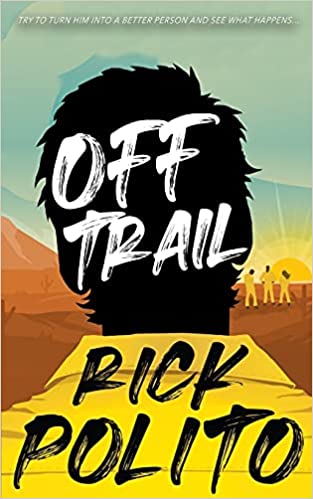Off Trail
Genre: adventure

Author: Rick Polito
Publisher: Wise Wolf Books
A laugh-out-loud coming of age story of one teen’s preposterous experience in a wilderness therapy program.
Daniel grew up in the shadow of his older sister, the brash, self-assured and utterly reckless Jackie, now living with her dirtbag boyfriend and wandering through dead-end jobs. When his parents find her marijuana stash in his closet and decide they do not want him to turn out like his sister, Daniel suffers the “trickle-down parenting” effect and is sent to Quest Trail.
Surrounded by other similarly uprooted teens, Daniel endures a series of preposterous self-discovery exercises and gets caught up in a rivalry with Troy, a too-tough poser, as they vie for the attention of Vera, a charismatic California teen who grew up with too much money and not enough emotional connection.
Just as Daniel’s confidence begins to grow and things start to look up, the Quest Trail program dissolves into complete chaos.
Sometimes humorous, sometimes painful, Off Trail shows an authentic account of all the embarrassing and heart-wrenching moments of being a teen.
This novel works hard at being hilarious, and achieves it in places. The first-time author has talent with humor, the premise is awesome, the characters with all their angst and attitude are totally authentic and the strong sense of setting (the Arizona desert) is a bonus.
The “wilderness healing” juvie program is preciously funny in its setup, wacky leader and psychobabble: “truth wrench,” “growment,” “greatitude,” “wintentions,” and “delightenment.” (The kids, being sassy teens, refer to these terms as “bullshitism,” and their antics to sabotage the outfit’s efforts make for delightful reading.)
The dialogue is great and the first-person point of view works. But unfortunately, the author’s style of inserting long, drawn-out interior monologues (sarcastic “asides,” explanatory thoughts) in between action and dialogue feels intrusive. It slows the novel down considerably, making almost two thirds of the book telling-not-showing commentary. In short, it keeps explaining what readers could discern for themselves.
Yes, Sue Townsend’s Adrian Albert Mole (1980) and Daniel Handler’s Lemony Snicket books (1999) have pulled off that risky, difficult style; this does not. And yet, the author’s humor helps mitigate the weakness, and some readers may find it less annoying than others as the rollicking plot draws one forward.
“People,” the [leader] announced, “is this how we treat each other? You know, they call it friendship because it’s like a ship that we’re all on and if we’re not all rowing together, we’re all going to drown.”
Sometimes when you hear somebody say something like that, it takes you a few seconds to figure out that it doesn’t make any sense. This was not one of those times. For starters, you don’t “row” a ship and even if you did, and you stopped rowing, it’s not like you’re going to drown. I mean, he could have said something like “They call it friendship because even though it has nothing to do with ships, let’s party like it is a ship and who cares?... But he went on.
This over-propensity for asides, along with a number of grammatical errors (misplaced modifiers, awkward tense changes) and typos had me wondering where the editor was.
Parents might want to be aware there are lots of swear words and a fondness for the term “hard-on.” But it’s YA, after all.
The ending is poignant and well-drawn, realistic without ever succumbing to being over the top. Indeed, Daniel’s relationship with his sister adds sobering depth to an otherwise (almost) hilarious novel.
- Pam Withers
no-repeat;left top;; auto
